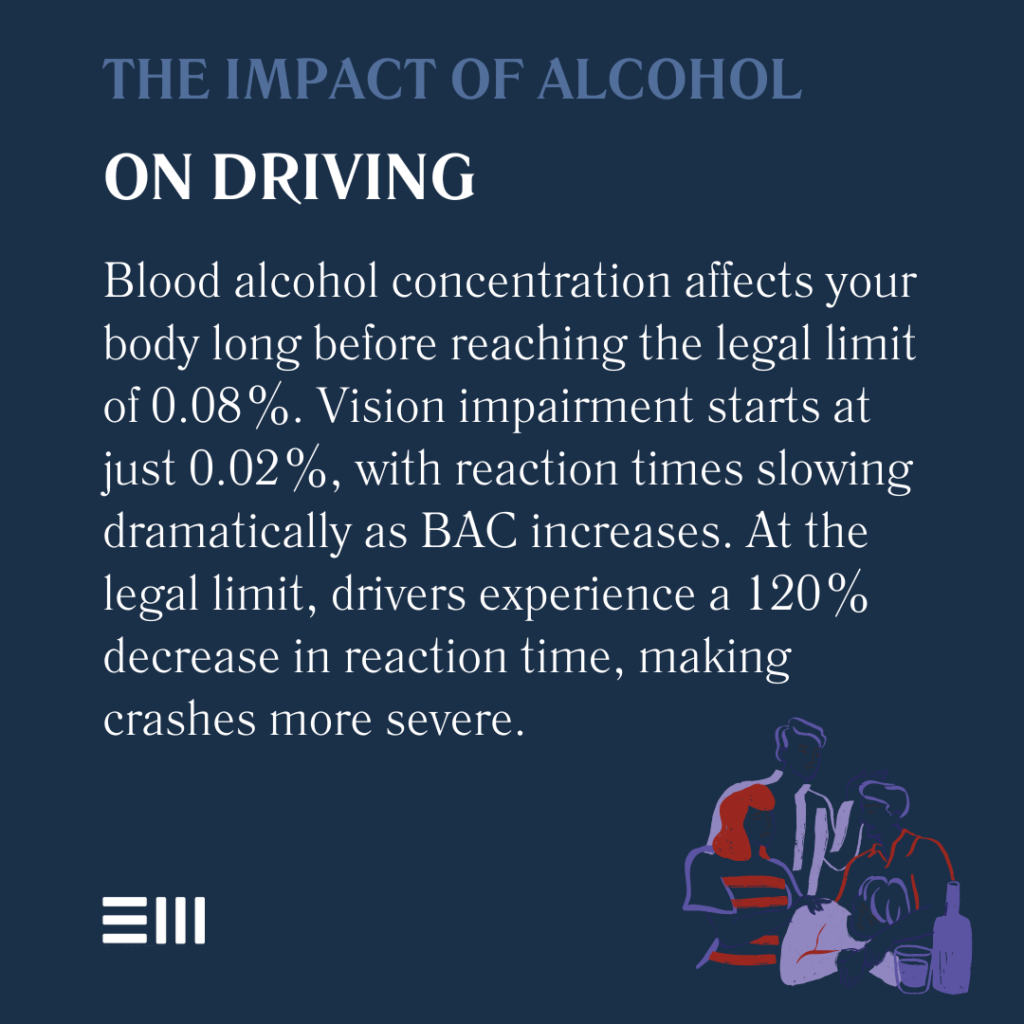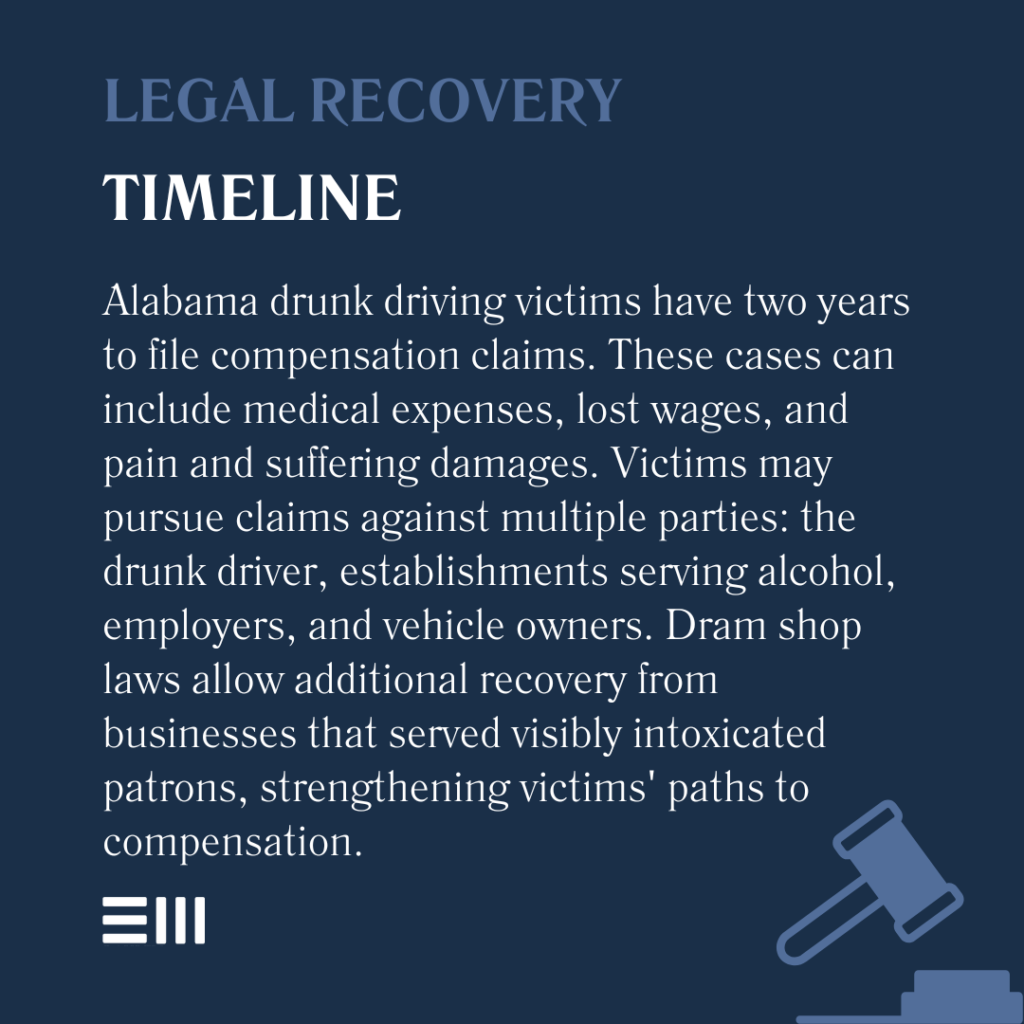
Every 45 minutes, someone dies in an alcohol-impaired driving crash in the United States.
The shattered windshield. The piercing sirens. The life-altering moment when one person’s choice to drink and drive transforms countless lives forever.
Across Alabama’s highways and rural roads, these preventable tragedies continue to tear families apart and devastate communities.
The aftermath extends far beyond the crash scene—through hospital corridors, courtrooms, and into the quiet moments where survivors struggle to rebuild their lives.
Understanding Drunk Driving Accidents in Alabama
The impact of alcohol on driving ability creates devastating ripple effects across our state’s communities.
From delayed reaction times to impaired judgment, alcohol-influenced crashes often result in more severe injuries and higher fatality rates than other accidents.
Alabama’s rural roads and highways present particular dangers when combined with impaired driving.
- Blood alcohol concentration (BAC) of 0.08% is the legal limit;
- Reaction time decreases by 120% at legal BAC limit;
- Vision impairment begins at just 0.02% BAC;
- 40% of Alabama traffic fatalities involve alcohol;
- Rural roads account for 58% of Alabama’s drunk driving fatalities;
- Young drivers aged 21-34 represent the highest risk group;
- Weekend nights show highest concentration of alcohol-related crashes; and
- Multiple offense rates exceed 30% among DUI arrests.
These statistics paint a sobering picture of drunk driving’s impact on Alabama communities. The combination of rural roads, high-speed highways, and alcohol creates particularly dangerous conditions that contribute to the severity of crashes.

Common Injuries in Alcohol-Related Crashes
Drunk driving accidents often result in catastrophic injuries due to higher speeds and reduced reaction times.
The severity of these injuries typically exceeds those in non-alcohol-related crashes due to impaired drivers’ tendency to not brake or attempt evasive maneuvers before impact.
- Traumatic brain injuries (TBI);
- Spinal cord damage;
- Internal organ damage;
- Multiple fractures;
- Severe lacerations;
- Psychological trauma;
- Whiplash and neck injuries;
- Crush injuries;
- Burns from vehicle fires;
- Permanent disabilities;
- Post-traumatic stress disorder (PTSD); and
- Chronic pain conditions.
The road to recovery from these injuries often spans months or years, with some victims never fully regaining their pre-accident capabilities.
Medical expenses can quickly overwhelm families, particularly when injuries require specialized care or long-term rehabilitation.
Alabama’s medical facilities, while excellent, often require victims to travel to major cities for specialized treatment, adding to the financial and emotional burden of recovery.
Legal Rights of Drunk Driving Accident Victims
Victims of drunk driving accidents have specific rights under Alabama law that protect their interests and ensure fair compensation.
Understanding these rights is crucial for navigating the complex legal landscape that follows an alcohol-related crash.
- Right to pursue compensation for medical expenses;
- Coverage for lost wages and future earning capacity;
- Pain and suffering damages;
- Punitive damages in cases of gross negligence;
- Property damage compensation;
- Wrongful death claims for fatal accidents;
- Right to sue establishments under dram shop laws;
- Claims against multiple responsible parties;
- Coverage for ongoing rehabilitation needs;
- Compensation for permanent disabilities;
- Mental health treatment coverage; and
- Loss of consortium claims.
Alabama’s legal framework provides strong protections for drunk driving victims, including the possibility of punitive damages to punish especially reckless behavior.
The state’s dram shop laws also allow victims to hold establishments accountable when they serve alcohol to visibly intoxicated patrons who later cause accidents.
This comprehensive approach to liability helps ensure victims have multiple avenues for seeking justice and compensation.

Frequently Asked Questions About Drunk Driving Accidents in Alabama
Understanding the legal and practical aspects of drunk driving accidents helps victims navigate their recovery journey.
These questions address the most common concerns faced by accident victims and their families in Alabama.
What Should I Do Immediately After a Drunk Driving Accident?
The moments following a drunk driving accident are critical for your safety and legal rights. Taking proper action can protect both your health and your ability to seek compensation. Here are the essential steps to take:
- Ensure everyone’s safety and call 911;
- Document the scene with photos;
- Gather witness information;
- Seek medical attention;
- Contact law enforcement; and
- Preserve evidence.
Taking these immediate steps can significantly impact the outcome of your case and your ability to recover damages. Professional documentation and prompt medical attention create a clear record of the accident’s impact and help establish liability.
How Long Do I Have to File a Claim in Alabama?
The statute of limitations for drunk driving accident claims in Alabama is two years from the date of the accident.
However, exceptions may apply in certain circumstances, such as cases involving minors or when the full extent of injuries isn’t immediately apparent. Acting promptly helps preserve evidence and witness testimony.
Who Can Be Held Liable in a Drunk Driving Accident?
Drunk driving accidents often involve multiple liable parties beyond just the intoxicated driver. Understanding all potential sources of liability is essential for maximizing your recovery.
Consider these possible responsible parties:
- The intoxicated driver;
- Establishments that served alcohol;
- Vehicle owners who permitted drunk driving;
- Other negligent parties involved;
- Parents of minor drivers;
- Employers of drivers on company time;
- Social hosts who served alcohol; and
- Vehicle manufacturers (in cases of defects).
Understanding all potential sources of liability helps ensure victims receive full compensation for their losses. Each responsible party may have different insurance coverage or assets available for compensation.
How Is Compensation Determined?
Compensation depends on various factors including:
- Severity of injuries;
- Medical expenses;
- Lost wages;
- Property damage;
- Pain and suffering;
- Impact on quality of life;
- Future medical needs;
- Loss of earning capacity;
- Emotional distress;
- Cost of rehabilitation;
- Need for long-term care; and
- Family impact.
Each case is unique, and compensation reflects both economic and non-economic damages. Alabama law allows for substantial recovery in cases involving drunk driving, particularly when punitive damages apply.
Your Path Forward Starts Here
Don’t face the aftermath of a drunk driving accident alone. Our experienced team stands ready to protect your rights and secure the compensation you deserve.
With decades of experience handling Alabama drunk driving cases, we understand the complex interplay of criminal and civil law that affects your recovery.
Contact us now for a free consultation and learn how we can help you move forward. Your future matters, and we’re here to fight for it.
Can't find what you're looking for? Search our site below.










